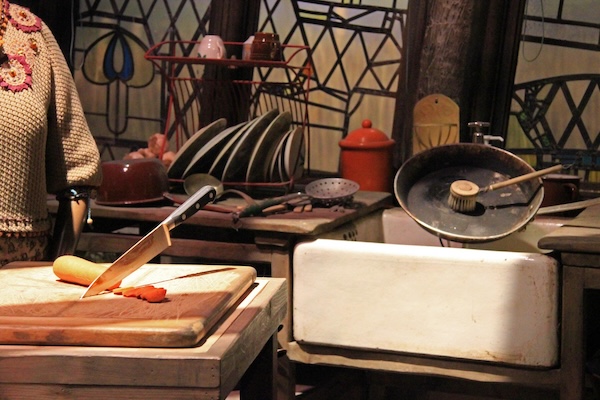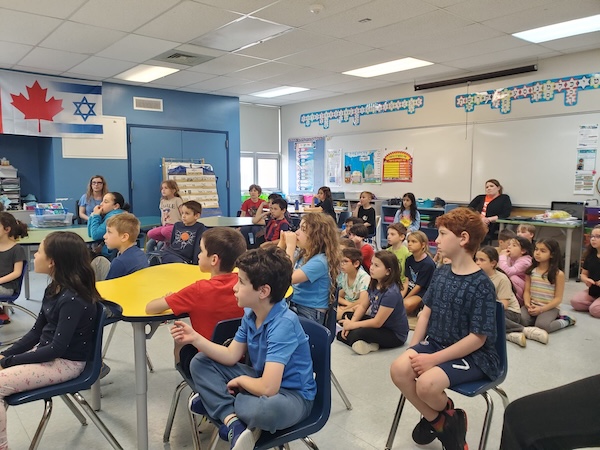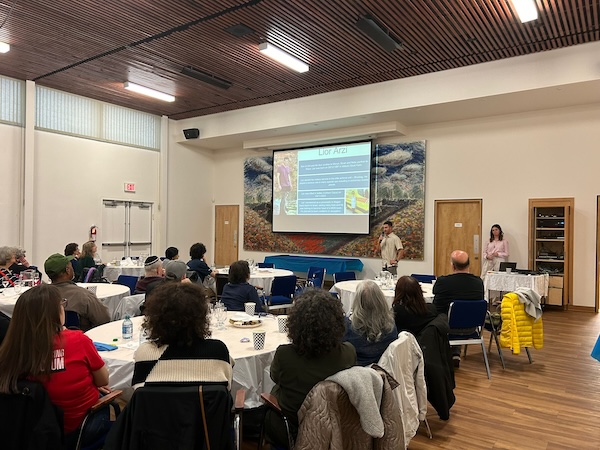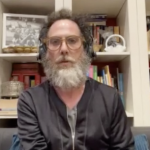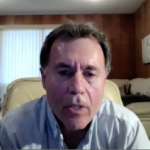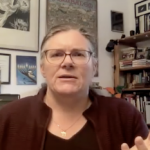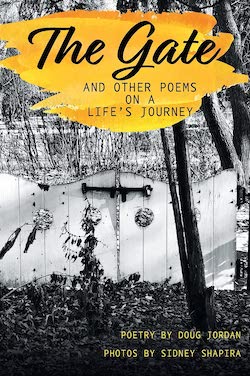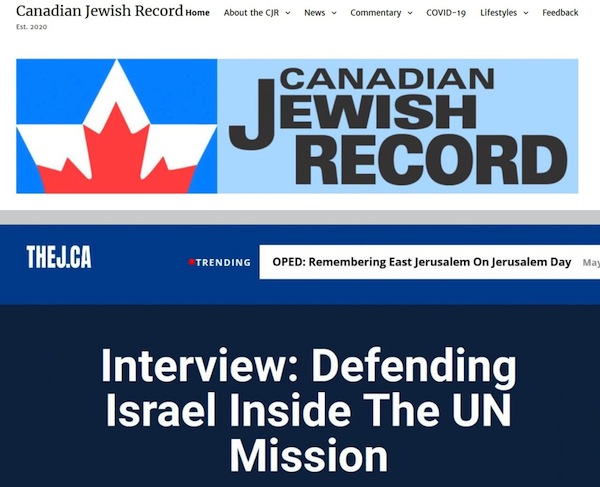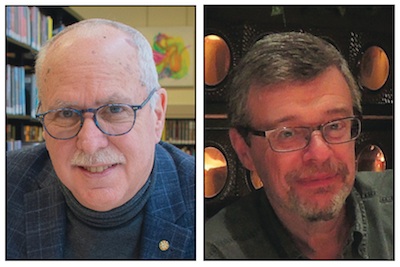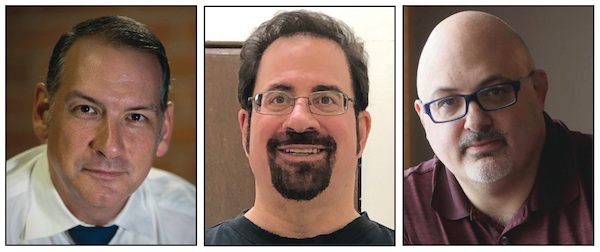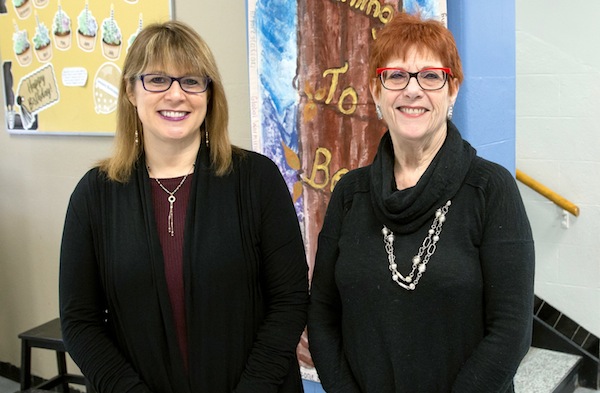We have a new rabbi at Shaarey Zedek, our Winnipeg congregation. This is exciting as well as reassuring for many people. Why? Well, Rabbi Carnie Rose is the son of a rabbi and professor who lived in Winnipeg for many years, Dr. Neal Rose. His brother, Kliel, is a rabbi at Congregation Etz Chayim, another nearby congregation in Winnipeg. So, while Rabbi Carnie is new as a rabbi in Winnipeg, he is also a deeply familiar entity. He became a bar mitzvah at Shaarey Zedek. He went to kindergarten with the synagogue’s current executive director.
This addition to our congregation is welcome, as Rabbi Anibal Mass and our chazzan, Leslie Emery, carry a heavy workload. They are still working hard, don’t get me wrong, but sometimes a new hire can offer support and everybody gets more breaks. I’m only observing this as a congregant and as the child of a Jewish professional. Sure, I serve on a committee, I show up to services, but I can tell there’s been a lot of work lately.
On a practical level, moving from the United States to Winnipeg is a big change. My family wanted to be supportive – after all, we too moved from the United States, in 2009 – so we’ve been helping Rabbi Carnie get his library in order. He’s got, as you might imagine, lots of books. These all got miserably jumbled in the move. While this has got to be stressful, he’s handling it all with good humour. We’ve taken pleasure at getting to look at and learn about all sorts of resources in Hebrew and English that we hadn’t seen before. Some books are like old friends, as I studied them as an undergraduate or in graduate school, but, to be honest, my books aren’t in nearly such good condition.
This experience mirrors many Jewish volunteer activities I did as a kid. As the child of a Jewish education director, who then went on to be the administrator (executive director) of my childhood congregation, Temple Rodef Shalom in Falls Church, Va., I spent many afterschool hours folding the weekly paper bulletin handed out on Shabbat, moving books or setting up chairs. While attending services or religious school were important activities, for me, the relationships I made with the rabbi and the staff and other congregants as we did these small jobs were the most meaningful ones. Along the way, I met many important guests, though it’s all a bit blurry now. For instance, I sat next to Elie Wiesel once after he spoke at our congregation. What I remember particularly is how formal and dressed up we were. Also, the dessert was good! I was allowed to stay up way past my bedtime.
Now, I’m proud that my kids are finding their way towards making their own community connections. One of my twins has gone to morning minyan many times this summer. He’s the only teen there and gets a lot of positive attention this way, including exchanging ideas with a retired provincial court judge. This judge also happens to be the father of my son’s elementary school principal, so we’re always on good behaviour with him!
My other twin isn’t getting to morning minyan much, but instead he volunteered for full weeks at a summer camp and daycare, helping little kids. He also helps on the synagogue tech team, doing accessible subtitles for prayers that are projected on screens as part of our service. This job is an important one, as it enables people to keep up with the service even if they are having a hard time hearing what’s going on or cannot read Hebrew. He’s been asked to help during the High Holidays. It’s a big honour and responsibility for a 14-year-old.
These commitments are important because they embody both the Canadian emphasis on volunteering and the Jewish one. When I was a teen, I lived for a year on a kibbutz. Volunteering was considered deeply valuable and important. Being the first to volunteer was a moral virtue. Yet, when I hear Winnipeg kids discuss accruing volunteer hours for school credits, it’s seen as an onerous requirement. Perhaps, for some, this requirement doesn’t have great value. On the contrary, in our household, we see these experiences as offering so many learning and growth opportunities.
While we moved books, searched for lost volumes and organized sets of Talmud and commentaries, we also saw the bustle behind the scenes as the congregation gets ready for Rosh Hashanah. There’s so much pageantry to the High Holidays. It’s a big deal. Some members jockey for important honours or specific seats and we listened with interest. We just wanted seats near the back, near where our kid would be in the tech booth. When I mentioned this to the new rabbi, I suggested that maybe different things matter to us. After all, I joked, I didn’t need to show off a new hat. (My mom always said this was an important part of High Holiday services when she was a kid in the 1950s!)
As for honours, we love a quiet summer Shabbat, when sometimes our kids get asked to read or are called up for an aliyah because no one reserved them in advance. These spur-of-the-moment experiences, where we might help out and take part in services, feel like the right spot for us. It may take months of practice to chant one part of the Torah portion, but we try to aim for a week when not much is happening.
A strong community is one where we can all contribute and help. Yes, big donors and fancy new hats are often part of the High Holidays. Big monetary donations keep the heat on, and status matters to many. However, a synagogue, and the Jewish community, must function throughout the year.
There’s a lot to think about when it comes to evaluating how we’ve behaved in the past year, and how we’ll make amends. To me, the most important reflections aren’t about where we are or how we behave specifically on Rosh Hashanah and Yom Kippur. In every regular weekday morning minyan, we also say “ashamu” – we are guilty. We work on ourselves all the time. Perhaps, while it’s important to have good intentions when it comes to the High Holidays, it’s also key to think about each day beforehand, and afterwards, too. Elul’s a whole month of reflection. Valuing one another and our community means making every day count.
Joanne Seiff has written regularly for the Winnipeg Free Press and various Jewish publications. She is the author of three books, including From the Outside In: Jewish Post Columns 2015-2016, a collection of essays available for digital download or as a paperback from Amazon. Check her out on Instagram @yrnspinner or at joanneseiff.blogspot.com.

